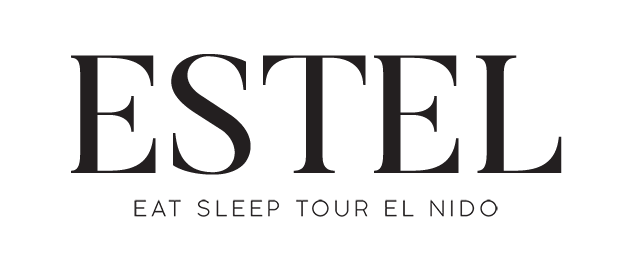Introduction to ESTEL 2017
The focus of ESTEL is to be a voice for Eco-Sustainable Tourism in El Nido (E.S.T.EL) for smaller businesses but in spite of a lack of support from various sectors in town, private businesses have moved forward. As a result ESTEL acronym currently sits as Eat, Sleep, Tour, El Nido.

As owners of a very small business, The Birdhouse El Nido, Camille and I, had difficulty finding programs and support for eco-tourism in town. Throughout the year that we’ve been operating we noticed a disconnect between small business owners, even as great ideas float around. In town, there a few notable individuals, such as Judith Distal of Art Cafe and Mariglo Laririt the Director of Sustainability at El Nido Resorts, with strong advocacies for the community and the environment. However, the colossal issues this town faces with the boom of tourism is quite overwhelming. Part of our advocacy is to present stories of different efforts towards sustainability each month in ESTEL. Organizing a magazine or anything collaboratively on island time and with the hustle of catching up on the explosion of incoming tourists is difficult. So instead of chasing for stories for the first issue I decided to start with some of our own story.
*Note: This was originally posted in ESTEL Magazine’s Issue 1 as the Editor’s Note
ECO-STORY
Steps towards climate resiliency

Camille and I came to El Nido after a 16-month honeymoon. During that time we volunteered in Costa Rica and saw the effect of eco-tourism on its community, its visitors and the environment. We believed that with what we’ve seen as travelers we could connect some of those ideas with what was happening in El Nido. We believed in the art of storytelling and were constantly vocalizing our dreams of changing the travel industry in the Philippines, narrowing that more and more as we find our niche.
Even though major players such as the local government and the Ayala Corporation have their own narrative with their influence on eco-sustainability, small ones such as ourselves were left on our own. Coming from the US and never having to think about where water comes from or where garbage goes, our setting up The Birdhouse was a huge eye opener. Building on a hill was an added complexity, hauling of materials, erosion control, and water and waste systems were all things we honestly didn’t think about prior to initiating this project.
Simply put, we ended up unintentionally creating a negative impact on our environment. “Eco” became a term people threw at us when they saw the glamping tents up, though we never claimed to be an “eco-hotel.” We simply found some business solutions in the form of ecologically sound systems but only after hiring Ignacio Sayajon, our in-house sustainability consultant.
Erosion was an issue during the rainy season and as a reaction we ended up creating climate resilient permaculture structures in the form of swales to capture water. Instead of allowing water to leave the property we created a way to feed it into our water table preventing issues of water shortage in the summer. Since then we’ve become more preventative rather than reactive.
With breakfast, lunch and dinners being served, having food security and proper waste management system was critical in our operation. We created Bokashi and vermicompost infrastructure for composting. To create a full circle on food we ended up collecting nearly 300 kilos of kitchen waste in less than 2 weeks from one neighboring establishment. This ended up in our compost, helping us cultivate tons of worms, great soil, and some vermitea for the plants. These efforts saved us from buying gardening soil at approximately 10 php per kilo. This material will feed our garden and create a cycle of farm to table and table to farm concept which will mitigate our costs on transportation and food.
These days post-construction we’re looking at transitioning from a generator run resort to a higher reliance on solar power. We’ve had a few other small businesses come up to The Birdhouse and have asked some of our flock to design and consult other businesses for environmental issues, ranging from food insecurity, permaculture design, and waste and water management. We hope to help empower others both big and small to be “eco”, not just economically but also ecologically.





